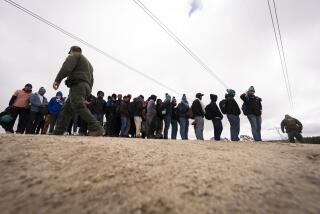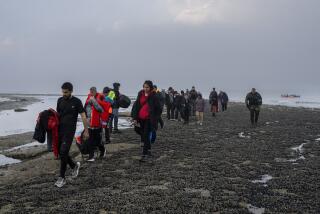The Asylum-Seeker: Persecuted and Unwanted in Europe
“They don’t have the right to treat another like a dog,” said a Jamaican woman last week. In Fullerton, a man had taped the muzzle of a neighbor’s pet to stop its barking and the animal had died of heat stroke. But 7,000 miles away in London, the Jamaican woman wasn’t talking about a dog: She was talking about her sister.
Joy Gardner, 40, had tried to resist when police arrived at her home to deport her, so she had to be restrained. She died in a hospital four days later. At first, police said she had suffered renal failure. It took a week before they admitted she asphyxiated after having her mouth taped shut to keep her quiet.
To be an asylum-seeker is to be uniquely vulnerable. Persecuted in your own country, unwanted in any other, the refugee is at the bottom of the heap, victim to random abuse by the lawless with whom they have to deal--the smugglers of human cargo, the drivers, the go-betweens, the extorting border guards--and the agencies of the law to whom they turn for protection.
A more enlightened age signed up to the 1951 Geneva Convention on Refugees. It was a visionary document, but one that saw refugees only as those fleeing political persecution. It excluded those in economic distress--a difference with no moral basis--forcing many migrants to misrepresent their status and get deported. Now that the West sees itself in economic distress, however, it is wriggling out of its commitments. From the 330,000 Bosnians trapped in refugee camps in Croatia because they can’t get Western visas, to the “accidental” death in police custody, something ugly is unfolding on the world stage.
Ugliness at the top trickles down to the pettiest levels. “There are proven cases of (European) immigration officers behaving unlawfully--criminally--to prevent asylum-seekers making claims,” says David Burgess, a leading British immigration lawyer. “They pretend that asylum claims have not been filed, or been filed incorrectly. The United Kingdom paid out 115,000 ($170,000), plus legal costs, when 23 Turkish Kurds were illegally deported back to Turkey, where three of them, we know, were detained for 34 days and tortured.”
In theory, Europe should be welcoming its immigrants for their initiative, ambition and guts. It needs them. With the lowest fertility in the world, Europe’s population is aging and its work force is shrinking. That means a shrinking economy. New arrivals would counteract that trend, help maintain living standards and expand the home market. Yet, everywhere, the doors are slamming shut.
In one of the fastest, most concerted yet least commented on policy shifts ever seen, Europe has, in the last three months, added the finishing touches to what is now a virtually zero-immigration enclave. Hobbled by recession and unemployment, countries that once harbored the restless, as well as the beleaguered, have become hostile No-Go zones.
The excuse is the collapse of the Soviet bloc. In the past, communism could be relied on to keep its borders sealed. With the emergence of democracy and under pressure from the West, the policing has stopped. The result has been a scramble among the huddled masses to seek a new life. In Romania, Bulgaria and ex-Yugoslavia, they’re escaping persecution.
Now, the Western nations that encouraged the free flow of peoples are said to be eating their words. “Overwhelmed by migrants and too broke to support them, the nations of Western Europe are pushing the newcomers back home,” wrote Time last month. Adds the Economist: “Many European countries worry that the countries of the former Soviet Union could revert to their 19th-Century role as big exporters of people.”
True. But the flight of Eastern Europeans has also been a godsend for West European governments. In the past, when immigration was mainly Third World, it was impossible to erect blatant barriers without attracting the charge of racism. Today, they can exclude everyone and appear even-handed. “Keep one out, keep all out--that’s only fair.”
Hence the smug looks on the faces of right-wing European politicians. Winston Churchill, a member of Parliament and grandson of the wartime prime minister, argues that cracking down on immigrants actually halts the growth of racism. Says France’s new right-wing Interior Minister Charles Pasqua: “Would you rather people voted massively for the extreme right?” Keeping out the hoards appeases national fears of foreign gate-crashers and job theft. It also keeps populist parliamentarians in power.
Germany has seen the most substantial changes. In May, it amended its constitution and scrapped what had been the most liberal asylum conditions in Europe. In June, European interior ministers agreed to make tighter checks on immigrants and speed up the expulsion of those judged as illegal. In July, France passed new laws making it harder for foreign children born in France to become French citizens, and Britain stopped refugees on tourist and student visas from being able to appeal if requests for extensions are turned down. It’s been quite a summer.
Countries known to persecute or unable to absorb refugees have also been declared safe for instant deportation. Procedures for checking asylum claims have been slashed from months to days. Police have been given powers to stop and search suspicious foreigners. And border patrols have increased.
“European countries are undermining the institution of asylum,” contends Johannes van der Klaauw, Amnesty’s European director. “They’re violating human rights and international conventions by dumping asylum-seekers and redefining claims as fraudulent or invalid. It’s unethical but it’s not strictly illegal, because these protocols can’t be legally enforced. There’s no institution in which to bring a state to court.
“When I told a foreign-office official of the Belgian government (current president of the European Community) that methods used to keep out migrants were putting genuine refugees at risk, he said ‘That’s just tough luck.’ All Amnesty can do is lobby.”
By rigging the system, EC governments have started a chain reaction that facilitates routine abuse at lower levels--among officials, police and immigrants themselves. Unable to enter Europe legally, immigrants are forced to pass themselves off as asylum-seekers--a test they’re most likely to fail--or enter illegally. When local officials automatically return people caught swimming to Germany across a border river, even if asylum is claimed, they can assume they are acting with governmental support.
At many airports, travelers flying to Europe are screened by non-qualified airline staff. Their first duty is to protect their companies from the $3,000 fines levied against them for any passenger entering without a visa. Their decisions may be arbitrary, hasty and wrong.
So may those of qualified staff. Peruvian and Dominican asylum-seekers arriving with cigarette burns and other marks of torture are invariably turned back for fear of letting in terrorists. Bosnian rape victims are sent back on the grounds that the war is an internal affair, or that they’re not being targeted for their political views, or because they don’t have visas, which is not surprising since most countries have withdrawn their embassies from Sarajevo. The frustrations that lead to violence in prison cells are understandable.
They are also unnecessary. “Speaking personally,” says Karsten Luthke, director of the German Documentation Center for Refugees, “I don’t have any problem with (the high immigration figures we had before.) Germany has been able to absorb hundreds of thousands of ethnic Germans from the ex-Soviet Union and Poland because there’s a political will to do it. (And it’s continuing to do so--next year’s quota has been raised by 10%.) The immigrant issue is used to create scapegoats for economic problems.”
“If governments attacked the root cause of immigration,” adds Johannes van der Klaauw, “people would have less reason to flee. There has to be a shared approach that relates asylum policies to economic aid.” Add to that a domestic program for education and integration. And the political will to do it.
More to Read
Sign up for Essential California
The most important California stories and recommendations in your inbox every morning.
You may occasionally receive promotional content from the Los Angeles Times.










